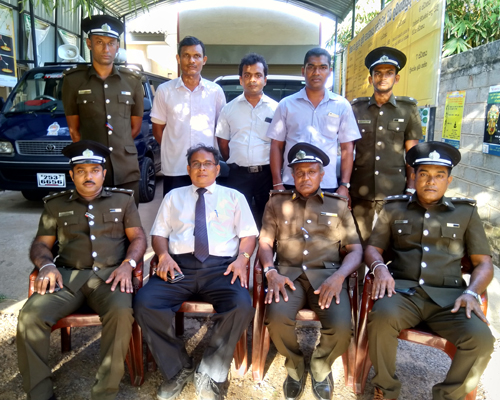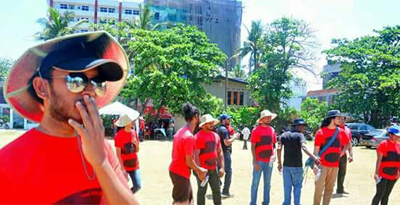News
A first-responder’s life and duty in virus-times
Dr. Upul Jayathilaka (46), Medical Officer of Health (MOH), Nattandiya:

Nattandiya MOH Dr. Upul Jayathilaka with his team, SPHI G. Perera; PHIs Sagara Samarasingha, Chaminda Jayasekara, Nissanka & Abeyrathna; drivers Anurasiri & Kamal; and Health Assistant Manjula.
That night our work ended around 10.30. It was March 28 and a person admitted to the Marawila Hospital the previous day had tested positive for COVID-19.
We were on the road the whole day. We did not think of it as a challenge. This is our work. We traced 25 contacts of this patient and quarantined them in 16 homes including that of the patient.
My team comprising four Public Health Inspectors (PHI), one Supervising PHI and myself returned to the MOH Office, had a discussion about our work in the next few days over a scrap dinner prepared by a PHI and then roughed it out in the office, for every day we had an early start.
I am the grassroot-level team manager of Nattandiya, an area of around 72 sq. km. with a population of over 58,000, ably guided by my Regional Director of Health who provides whatever we need in our line of duty. I report to her directly. I have 20 years’ service and 14 years in public health.
To enable me to get about my work easily, I usually live with my 76-year-old mother, a retired teacher, in the Paluwelgala village in a corner of Nattandiya. But these days I don’t go home because the work hours are long and it is among those with COVID-19 and I don’t want my mother by any chance to get exposed to the virus. My wife who is also an MOH is in Dankotuwa and we have two children.
My village people know that I am serving the country and they will rush to my mother’s help, even though my sister too lives close-by, like they did when she did not have water. They repaired the tap and restored the water-line. They provide me moral support so that I can go about my work without worry and my wife looks after the home-front efficiently.
In the field, we get the full support of the Divisional Secretary and staff including the Grama Niladhari and also the security forces including the police.
While we handled the technical part of the health intervention, the restriction of movement, sancharanaya, not lockdown, of Gemunu Mawatha was carried out by the police and armed forces which set up security points.
Like all human beings people bayawenawa (are fearful) when something strange happens in their lives but we reassured them and they cooperated and became friendly with us. I visited them four times each day and the very next day (March 29), four people including a chute baba (four-month-old) in the patient’s home had fever.
I am in the front-line. I parked my cab some distance away from this home and donning the personal protective equipment (PPE), gently guided them to the Suwaseriya (1990) ambulance. Egolla kelenimma avilla ambulance ekata negga to go to the hospital. I wear the PPE so that I would be able to hold them if they stumble or fall. We have everything we need like alcohol-rub etc in our vehicle.
By the 14th day, the other 15 homes came out of quarantine, with RT-PCR testing of the people coming up negative. At midnight on April 11, we declared these homes free of infection and there is fulfilment in seeing the relief of the people.
My team works very closely and this is all in our line of duty. We don’t feel kusaginna (hunger) or pipase (thirst), only thrupthiya (self-satisfaction).
Small study uncovers three strains of COVID
The new coronavirus mutated into three distinct strains as it spread across the globe, researchers at Cambridge University have found, but their study has drawn criticism from peers on the grounds that it is too small (160 samples) to come up with any conclusion.
According to the researchers:
- Type A – The original virus that jumped to humans from bats via pangolins. Surprisingly, it has been found that this is not the strain most commonly found in China. It is reported to be more prevalent in Australia and the United States of America.
- Type B – Wuhan, the epicenter of the new coronavirus in China, had this strain. It is also reported to be prevalent in Europe, particularly in the United Kingdom. Belgium, the Netherlands, Switzerland, France and Germany also have dominant cases of this strain.
- Type C – Dubbed the ‘daughter’ of Type B as it is only one mutation different, this strain is commonly found in some parts of Europe and Asia including Singapore.
| COVID-19 progression in Sri Lanka | |
| There was much concern among experts over two clusters of COVID-19, originating from Suduwella, Ja-ela, and Pannila and China Fort in Beruwala.Every single person who has had contact in these cases needs to be traced, they urged, while some also alleged that there were about seven deaths from different hospitals, not those treating the virus-infected, for which COVID-19 was suspected. These deaths should be looked into closely, they said, and the contacts of the deceased traced, quarantined and monitored. A relative, of a 36-year-old from Kalubowila who died on April 5 at a main hospital in Colombo, said they were awaiting confirmation whether he had died of COVID-19 or not. He had gone to many places before his death to distribute adara (food packages), the relative said. The Sunday Times also learns of several other such deaths over which there were doubts whether they were COVID-19 or not, with health experts deeply concerned over a new string of infections. Referring to the Suduwella incident, meanwhile, Ja-ela PHI K.A. Anura Abeyratne said that on April 5, a coconut plucker who had earlier been a three-wheel driver and addicted to drugs, had attempted to pluck some coconuts on the sly along with three others when people stoned them. The other three fled. When the coconut plucker was tested, he was positive for COVID-19 and the Suduwella area had been put under lockdown with 55 contacts of the patient being traced. Twenty-five of them have been sent for quarantine at the Ampara navy camp and Kachchativu, while the others are in home quarantine. Eight close contacts including the wife of the patient have been tested positive for the virus as also two staff members of the hospital the first patient was taken to initially. On April 14, meanwhile, Pannila and China Fort were identified as high risk and put under quarantine, while on April 15, 113 people from Nagalagam Street in Grandpass were sent for quarantine after a person there was traced to have been in contact with a COVID-19 confirmed person from Suduwella. In a different operation on April 15, the navy’s Chemical, Biological, Radiological and Nuclear (CBRN) Unit ferried an Indian crew member of the merchant vessel ‘Menkar’ as he was suspected of having COVID-19, from 12 nautical miles out at sea to the Colombo port. The sailor tested negative but is receiving treatment for a different ailment, said Navy Spokesman Lt. Commander Isuru Suriyabandara.
|
A plea to help the hearing-impaired

A group of hearing-impaired enjoying Avurudu celebrations in happier times
A badly-hit group in the current lockdown are about 500 hearing-impaired people in the Western Province.
Making a plea on behalf of this vulnerable group, a majority of whom are also dumb, a representative of the Western Province’s Deaf Association, Rangana Madusanka said that there are three ‘stations’ in Gampaha, Kalutara and Dehiwela and most of these families are starving as 90% of them are daily wage-earners. They are unable to work due to this crisis. Some of these families also have members with other disabilities.
He related a heart-rending call from a family, deaf parents and two school-going children, in Gampola about having nothing to eat. They were living on meagre portions of manioc.
Rangana made an earnest appeal for dry rations as it was more valuable than money these days.
For more details, please contact 0770285954.
Vaccine in the pipeline
A vaccine against COVID-19 is on the cards and may be ready as early as September.
“We are 80% confident that the vaccine will work,” Oxford University’s Professor of Vaccinology, Sarah Gilbert has said.
The project is a joint venture between the Italian company Advent-IRBM based in Pomezia, south of Rome, and the Jenner Institute of the University of Oxford.
The vaccine design is based on already-developed vaccines which work for malaria, tuberculosis and the Middle East Respiratory Syndrome (MERS) caused by a coronavirus. Testing on 550 volunteers is due in late April.
This team is part of a global effort to find a vaccine for the new coronavirus.
| WHO puts damper on BCG protection for virus | |
| As excitement mounted over whether countries which immunize their people against tuberculosis (TB) with the Bacillus Calmette–Guérin (BCG) vaccine is less affected by COVID-19, the World Health Organization (WHO) strongly refuted this by stating that there is no evidence that it protects people against the virus.Two clinical trials addressing this question are underway and the WHO will evaluate the evidence when it is available. In the absence of evidence, the WHO does not recommend the BCG vaccination for the prevention of COVID-19, the WHO has said. Researchers from America’s New York Institute of Technology said that they found that countries without universal policies on the BCG vaccination such as Italy, the Netherlands and the United States, have been more severely affected by the virus compared to those with such universal and long-standing BCG policies. At least six countries – Australia, Netherlands, Germany, United Kingdom, United States of America and Denmark – are running trials giving frontline health workers and the elderly the BCG vaccine, to see whether it provides some level of protection against the virus.
|
Mail sorting has begun, no halting of medicine distribution
The sorting of the heaps of letters and parcels at the Central Mail Exchange began this week. But the Postmaster General, Ranjith Ariyaratne, said that no deliveries will take place until the curfew is lifted.
More than 400,000 letters and parcels are piled up and even though the Postal Department has 3,000 employees, the sorting was begun with a limited staff of 20 due to the present crisis. These members follow all virus prevention criteria, it is learnt.
Mr. Ariyaratne added that the important task entrusted to postmen to distribute medicines to patients will also continue without disruption.


